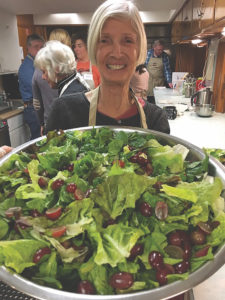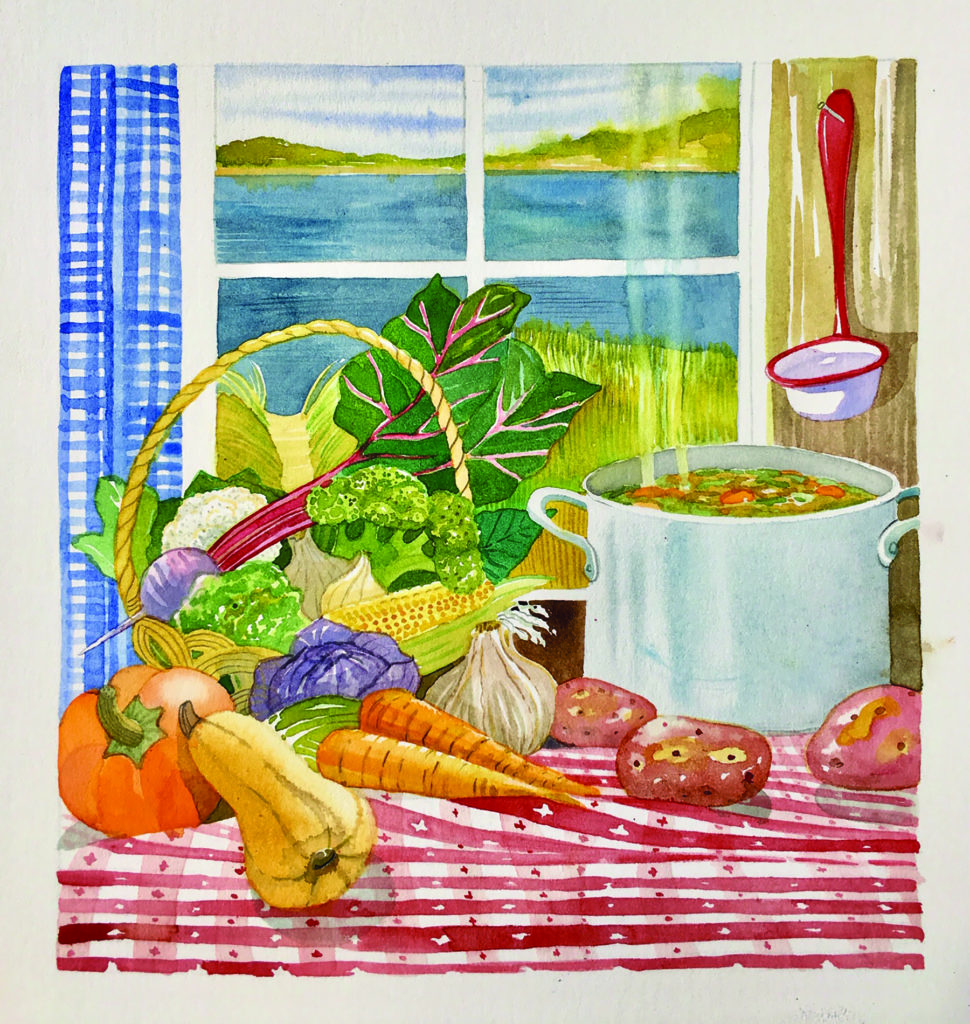
Every Tuesday night starting Oct. 29 there will be a dinner party with 100 guests at the Wellfleet United Methodist Church. Dana Franchitto will play classical pieces on the piano and the food will be prepared by teams of cooks who get a little competitive with their culinary creations.
Along with the best meatloaf on Cape Cod (a secret family recipe) the 246 Community Kitchen has been offering fresh, home-cooked meals with lots of vegetables and something even more nutritious, good company, for the last eight years from October through May, says Janet Drohan, the director.
Beginning in November diners will find a similar experience each weekday for lunch provided by the Soup Kitchen in Provincetown, or SKIP, at the Provincetown United Methodist Church. SKIP has been going since 1992.
While also run by a team of volunteers — and more are always needed — the soup kitchen employs Bethany Gregory, a professional chef who runs Tween the Tides, a takeout restaurant, in the summer. In the winter, however, she’s all about feeding the needy.
“Needy” in this case has more than one sense, as does the meaning of “hunger” on the Outer Cape, where the well-to-do and the struggling inhabit the same small and isolated towns each winter.
“You need companionship or you need the food,” says Philip Franchini, the chairman of SKIP. “Either way, you need it. It’s lonely in the winter. There are no jobs for a lot of these people, and we do get people who come daily and put in a donation every day. We don’t want to stigmatize people. Everyone needs it for some reason.”
The Provincetown and Wellfleet kitchens each prepare meals for more than 100 diners in a single day. This takes manpower. There are 45 volunteers who help put together the Tuesday night meals for the 246 Kitchen. Though the workload is divided up among teams, on Mondays there are chopping parties at 4 p.m. and volunteers from all teams can attend, Drohan says.
Volunteers who gather once or several times a week at SKIP have formed close friendships, Franchini says, to the point where they have their own potlucks at night. He is not aware of any marriages that have emerged from the camaraderie of cooking, but many now close friendships have started with peeling potatoes.
Similarly, the volunteers at the 246 Community Kitchen have come to know each other as cooks and friends. They had a holiday party last year with hors d’oeuvres “and, yes, it was competitive,” Drohan says.

The festiveness of having so many people cooking and eating together belies the underlying point of it all: to combat depression, loneliness, and real hunger, which on Cape Cod is a “hidden epidemic,” says Christine Menard, executive director of the Family Pantry of Cape Cod.
Not having enough money to buy food may be hard to fathom even for many of the guests at the soup kitchen or 246. But it is a reality that Menard witnesses daily.
The Family Pantry receives two 18-wheelers filled with food from the Greater Boston Food Bank each week. This is shared with some of the smaller food pantries, including 246 and SKIP, Menard explains.
For the past three years, the amount of food given out Cape-wide by the Family Pantry has increased by double digits, she says.
This year total visits to the food pantry are up 16 percent, Menard says, and the number of bags of food given out is up 15 percent. The number of new clients this year increased 30 percent. Use of the college food pantry for students, staff, and faculty at Cape Cod Community College has gone up 176 percent, she says.
“Think about it,” she says. “The Cape has a high cost of living. Rent is $1,600 a month for nothing. The living wage for a Cape Cod household is $54,000 a year. Then you have seasonal employment. You add the cost of living and a seasonal job and you’re toast.”
The beauty of both SKIP and the 246 Kitchen is that they address that need — both have take-home bags, which more than half the 246 guests take, Drohan says. And at SKIP they cook a sixth meal on Friday so people can take one to go for the weekend, Franchini says.
There is no income requirement or vetting of any kind, so that anyone can enjoy the free meals. If that inclusiveness adds to the expense, it’s money well spent because it allows everyone to eat and enjoy the bounty without stigma.
Wellfleet resident Heidi Koretz has been a regular at 246 for two years. She says people who don’t need a free meal should still come and put $20 in the jar to support the community. And, she adds, they should “mingle.”
“That’s how you make a community,” Koretz says.
At 246, the volunteers tend to be a cadre of “young retirees” who have some time to spare, Drohan says, while the guests range from older people to young AmeriCorps volunteers (who share a house in Wellfleet and are paid very little) and staff from the Cape Cod National Seashore.
Tony and Susan Jackett, a longtime Provincetown couple now living in Wellfleet, bring their adult children and grandchildren every Tuesday to the 246 Community Kitchen.
“We take up a whole table,” Tony says. “We have to get there early.”
Tony says Susan loves it, because otherwise having five grandchildren and all the parents together at their house “is a lot of work.”
Drohan says 246 operates on $9,000 a year and donations have gone up. There are a lot more $20 bills in the jar at the end of the night.
“Food and love have always been synonymous,” Drohan says. “Everyone who is doing it has a heart as big as their chests.”



